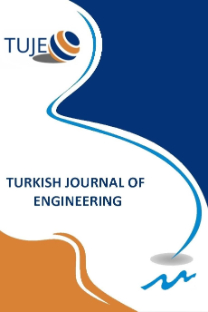EXPERIMENTAL INVESTIGATION OF FLOW STRUCTURE DOWNSTREAM OF PERMEABLE CYLINDERS
EXPERIMENTAL INVESTIGATION OF FLOW STRUCTURE DOWNSTREAM OF PERMEABLE CYLINDERS
___
- Akansu, Y. E. and Fırat, E. (2010). “Control of flow around a square prism by slot jet injection from the rear surface.” Experimental Thermal and Fluid Science, Vol. 34, No. 7, pp. 906-914.
- Al-hajerı, M. H., Aroussi, A. and Witry, A. (2009). Numerical Simulation of Flow Past Multiple Porous Cylinders. Journal of fluids engineering-transactions of the ASME, Vol. 131, No. 7, 071101.
- Corke, T. C., Enloe, C. L. and Wilkinson, S. P. (2010). Dielectric barrier discharge plasma actuators for flow control. Annual Review of Fluid Mechanics, Vol. 42, pp. 505-529.
- Ekmekci, A and Rockwell, D. (2010). Effects of a geometrical surface disturbance on flow past a circular cylinder: a large-scale spanwise wire. Journal of Fluid Mechanics, Vol. 665, pp. 120-157.
- Farhadi, M, Sedighi, K and Fattahi, E. (2010). Effect of a splitter plate on flow over a semi-circular cylinder. Proc. IMechE Part G: J. Aerospace Engineering, Vol. 224, pp. 321-330.
- Feng, L-H and Wang, J. J. (2012). Synthetic jet control of separation in the flow over a circular cylinder. Experiments in Fluids, Vol. 53, pp. 467–480.
- Fujısawa, N. and Takeda G. (2003). Flow Control Around a Circular Cylinder by Internal Acoustic Excitation. Journal of Fluids and Structures, Vol. 17, pp. 903– 913.
- Gim, O. S., Kim, S. H. and Lee, G. W. (2011). Flow control behind a circular cylinder by control rods in uniform stream. Ocean Engineering, Vol. 38, No. 17-18, pp. 2171–2184.
- Gozmen, B., Akilli, H. and Sahin, B. (2013). Passive control of circular cylinder wake in shallow flow. Measurement, Vol. 46, pp. 1125-1136.
- Gozmen, B. and Akilli, H. (2014). Flow control downstream of a circular cylinder by a permeable cylinder in deep water. Wind and Structures, Vol. 19, No.4, pp. 389-404.
- Hiejima, S., Kumao, T. and Taniguchi, T. (2005). Feedback control of vortex shedding around a bluff body by velocity excitation. International Journal of Computational Fluid Dynamics, Vol. 19, No. 1, pp. 87- 92.
- Li, Z., Navon, I. M., Hussaini, M. Y. and Le Dimet, F-X. (2003). Optimal control of cylinder wakes via suction and blowing. Computers & Fluids, Vol. 32, pp. 149–171.
- Lim, H. C and Lee, S. J. (2003). PIV Measurements of near wake behind a U-grooved cylinder. Journal of Fluids and Structures, Vol. 18, No. 1, pp. 119-130.
- Muddada, S. and Patnaik, B. S. V. (2010). An assessment of turbulence models for the prediction of flow past a circular cylinder with momentum injection. Journal of Wind Engineering and Industrial Aerodynamics, Vol. 98, pp. 575-591.
- Nakamura, H and Igarshi, T. (2008). Omnidirectional reductions in drag and fluctuating forces for a circular cylinder by attaching rings. Journal of Wind Engineering and Industrial Aerodynamics, Vol. 96, pp. 887–899.
- Ozkan, G. M., Oruc, V., Akilli, H. and Sahin, B. (2012). Flow around a cylinder surrounded by a permeable cylinder in shallow water. Experiments in Fluids, Vol. 53, No. 6, pp. 1751-1763.
- Pinar, E., Ozkan, G. M., Durhasan, T., Aksoy, M. M., Akilli, H. and Sahin, B. (2015). Flow structure around perforated cylinders in shallow water. Journal of Fluids and Structures, Vol. 5, pp. 52–63.
- Raffel, M., Willert, C. E. and Kompenhans, J. (1998) Particle Image Velocimetry a Practical Guide, Springer, Göttingen.
- Sahın, B. and Ward-Smith A. J. (1987) The use of perforated plates to control the flow emerging from a wide-angle diffuser. Heat and Fluid Flow, Vol. 8, No. 2, pp. 124-131.
- Sudhakar, Y. and Vengadesan, S. (2012). Vortex shedding characteristics of a circular cylinder with an oscillating wake splitter plate. Computers & Fluids, Vol. 53, pp. 40–52.
- ISSN: 2587-1366
- Yayın Aralığı: 4
- Başlangıç: 2017
- Yayıncı: Mersin Uüniversitesi
EXPERIMENTAL INVESTIGATION OF FLOW STRUCTURE DOWNSTREAM OF PERMEABLE CYLINDERS
Hüseyin Akıllı, Bengi Gözmen Şanlı
APPROACHES TO THE DESIGN OF A PLANAR PARALLEL MANIPULATOR
AUTOMATIC SLIDING DOOR ROPE MECHANISM DESIGN FOR VEHICLES
Hüseyin Mutlu, Burak Emre Yapanmış, Alper Günöz
MODULAR APPROACH TO THE DESIGN OF PATH GENERATING PLANAR MECHANISMS
APPLICATION OF HOMOTOPY PERTURBATION METHOD TO HEAT TRANSFER IN NANOFLUIDS
Jonathan Oahimire, Olusegun Adeokun
Bengi Gözmen ŞANLI, HÜSEYİN AKILLI
Nihan Aydın ERTUĞRUL, Zübeyde Hatipoğlu BAĞCI, Özgür Lütfi ERTUĞRUL
